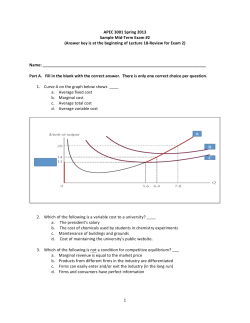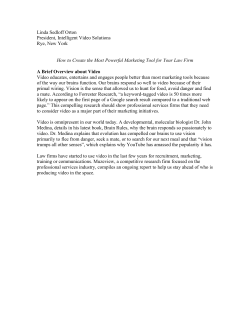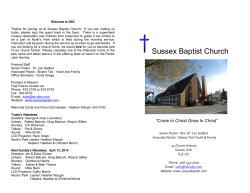
Connect with SPRU www.sussex.ac.uk/spru @SPRU E
Connect with SPRU www.sussex.ac.uk/spru @SPRU For general enquiries E spru@sussex.ac.uk T +44 (0)1273 873398 To receive regular updates on SPRU news and events, subscribe via sprucomms@sussex.ac.uk SPRU 50th Anniversary 2016 Keep in touch for updates, with an ambitious programme of events and activities planned. As part of our preparations, we are keen to hear from SPRU alumni so do get in touch. SPRU University of Sussex Jubilee Building, Falmer Brighton, BN1 9SL United Kingdom The SPRU way A message from Professor Johan Schot, Director Founded in 1966 by Christopher Freeman, SPRU was one of the first interdisciplinary research centres in the field of science and technology policy and management, and continues to be internationally recognised as a leading centre in this field. Today, with over 50 faculty members, SPRU is at the forefront of new ideas, problem-oriented research, inspiring teaching, and creative, high impact engagement with decision makers across government, business and civil society. What makes SPRU distinctive and excellent are the values around which it thrives. Through an emphasis on plurality, SPRU research and teaching spans the great divides between quantitative and qualitative, positive and constructivist, instrumental and critical. We strive to uphold values of academic excellence and solidarity in the collaborative production of knowledge – across both disciplines and hierarchies. We also pride ourselves on having impact and engaging outside academic arenas – with diverse real-world problems, pressurised policy-makers, powerful stakeholders, an impatient media and a restless civil society. As we look ahead to our 50th anniversary in 2016, we believe these are the values and expectations which will help SPRU excel for a further fifty years. To mark our anniversary, SPRU is embarking on an ambitious new strategy focused on long-term transformative change and innovation across different sectors, societies and structures. Whether it be in the provision of food, energy and healthcare, or in the development of more inclusive, innovative economies, our aim is to deliver new fundamental knowledge on the nature and governance of these transformative changes, as well as to offer practical ideas and solutions for setting the direction of change towards more positive societal outcomes. Our strategy will expand and build on SPRU’s proven track record across research, teaching, impact and engagement, and we look forward to working with colleagues across academia, government, business and civil society on these important agendas. Pioneering research Our research addresses pressing global policy agendas, including the future of industrial policy, inclusive economic growth, the politics of scientific expertise and funding, energy policy, security issues, entrepreneurship, and pathways to a more sustainable future. We are driven by a desire to tackle realworld questions, whilst also contributing to a deeper theoretical understanding of how innovation is shaping today’s world. Located within the School of Business, Management and Economics, SPRU is a dynamic contributor to the University of Sussex’s wider culture of research and teaching excellence. Transformative teaching and extensive outreach With a community of over 150 MSc and doctoral students from all over the world, SPRU is also well known for its high quality, research-led teaching programmes. Our multidisciplinary nature means that students have access to an extensive range of expertise, whilst also contributing directly to research as part of their training and development. With its extensive global alumni network among senior science and technology policy makers, SPRU is committed to engagement and generating impact, not only in the dissemination phase, but also by involving stakeholders in the framing and conduct of research. Our research themes SPRU is home to five major research centres and programmes Harvard Sussex Program STEPS Centre The Harvard Sussex Program, formally established in 1990, is an inter-university collaboration for research, communication and training in support of informed public policy towards chemical and biological weapons. The STEPS Centre, co-hosted by SPRU and the Institute of Development Studies, brings together development, science and technology studies with policy engagement activities involving partners in Africa, Asia, North and South America and Europe. Funded by the ESRC, STEPS researchers work on innovative approaches to social, technological and environmental sustainability that favour the rights, interests and values of marginalised and excluded peoples. Sussex Energy Group The Sussex Energy Group (SEG) is one of the largest independent social science energy policy research groups in the world. SEG aims to identify ways of achieving transitions to sustainable, low carbon energy systems whilst addressing other important policy objectives such as energy security and affordability. Centre on Innovation and Energy Demand The Centre on Innovation and Energy Demand, led by SEG in partnership with the universities of Oxford and Manchester, is one of six research centres on End Use Energy Demand funded by RCUK. The Centre adopts a socio-technical perspective and looks at the emergence, diffusion and impact of low energy innovations. The Nexus Network The ESRC funded Nexus Network fosters debate, innovative research and practical collaborations across the linked domains of food, energy, water and the environment. Working with the universities of East Anglia and Cambridge, participation is open to researchers from all disciplines, and to decision makers in government, business and civil society. Science, politics and decision making Whether it’s President Obama pledging to ‘restore science to its rightful place’ or President Xi Jinping calling for ‘innovation with Chinese characteristics’, the emphasis that leaders place on science and technology makes designing effective policies a priority worldwide. At the same time, scientific advice to inform policymaking is in high demand. From climate change to cybersecurity, food technologies to fracking, controversies continue to erupt at the boundaries between science, politics and society. Our research helps policymakers – and wider democratic debates – to set directions and priorities for science and innovation policy, and enables them to navigate uncertainties and controversies. We apply a deep historical understanding to how the choices made about science and technology shape our societies. SPRU researchers also work on the politics of expertise, and on issues of foresight, research assessment, metrics and impact in today’s research environment. A new SPRU-developed multicriteria mapping tool is now also available as a web service for assisting in strategic decision making. A particular focus of our work is the governance and policy challenges surrounding chemical and biological weapons, including issues of dual-use technology. The Harvard Sussex Program, co-hosted at SPRU for over 25 years, uses technology as the lens through which to view issues of conflict and vulnerability, and understand forms of innovation that arise from the security landscape. SPRU’s MSc in Science and Technology Policy is the world’s longest-established and most comprehensive introduction to this field, and has trained successive generations of policymakers who now occupy senior roles in governments, businesses and NGOs. Research highlights include: Governing geoengineering Professor Andy Stirling and Dr Rose Cairns are working with Oxford University and UCL to examine critical aspects of geoengineering governance to ensure that these controversial emerging techniques are fully considered in fair and balanced ways in comparison with alternative ways to address climate change. Understanding biological disarmament Dr Caitríona McLeish’s work is aimed at providing a rich historical account of the birth of the 1975 Biological Weapons Convention and writing that convention into the historiography of the Cold War. The science of scientific advice Building on the influential 2013 book, Future Directions for Scientific Advice in Whitehall, co-edited by Professor James Wilsdon, this strand of work focuses on the role of advisors, advisory bodies, science policymakers and experts across different national and international systems. Technocratic internationalism Professor Johan Schot’s Making Europe six-part book series (co-edited with Professor Phil Scranton) charts a new transnational history of Europe through the lens of technology. His own contribution focuses on the role of experts in international decision-making, and unravels the technocratic origins of the European integration process and the dilemmas this poses for democracy. Economics of innovation and industrial policy Modern capitalism faces great societal challenges. In an era of financial crisis and austerity coupled with serious global issues such as climate change and growing inequality, it is critical to address the pressing challenge of reigniting and redirecting economic growth and driving the innovation needed for sustainable, inclusive growth. SPRU’s research focuses on advancing the economic theory of innovation, whilst also resetting the foundations of orthodox economics and advancing the fields of evolutionary and institutional economics. We seek to understand the structure and dynamics of innovating firms and industrial systems and how to manage innovation capabilities in firms, including research and technology change in high-tech industries and managing uncertainty in complex systems. Our research addresses policy-relevant issues ranging from fostering inclusive growth and innovation; the feedback relationship between finance and innovation; and mapping complex patterns in firm and market dynamics. Our key concern is to help strengthen innovation and industrial policies around the world. Research highlights include: The entrepreneurial state The influential work of Professor Mariana Mazzucato, through her book The Entrepreneurial State: debunking public vs. private sector myths (FT Books of the Year), the FP7 FINNOV project and the 2014 ‘Mission Oriented Finance for Innovation’ conference, has prominently featured in debates over innovation and growth in the UK, the USA and Europe. Entrepreneurship, innovation and the growth of firms Using frontier econometric techniques, Dr Alex Coad is developing insights into the characteristics and performance of entrepreneurs, firm growth, and industry dynamics, with a particular focus on new small businesses. Patterns of inclusive innovation and learning Research by Dr Matias Ramirez aims to understand how producer networks, and different lead organisations, influence opportunities for inclusion of small and micro producers in the introduction of new practices in industry and agriculture. Structural change and the economics of technical change Dr Maria Savona investigates the impact of technical change on long-term structural transformation in service sectors. She also works on applied innovation theory. Her research is contributing to the debate on industrial policy as a strategy for developing countries. Financial and industry dynamics Professor Mazzucato’s work, in collaboration with colleagues in the University’s School of Business, Management and Economics, seeks to understand stock price volatility over long historical periods, and the degree to which ‘excess volatility’ relates to the fundamental uncertainty underpinning radical innovation. Energy, sustainability and development How do we meet the world’s growing need for water, energy, and food in an equitable manner without compromising the environment or future generations? Despite increasing reference to a more sustainable world, global progress remains slow. We need to urgently find ways to facilitate both growth and sustainability, whilst also addressing environmental degradation and poverty. Since the 1970s, SPRU has been at the heart of international debates about the role of science, technology and innovation in fostering sustainability and development. Through the Sussex Energy Group (SEG), we combine academic research with practical application in the area of energy policy. Our research seeks to identify pathways to facilitate global transitions to a sustainable future, looking at key areas such as energy, food, agriculture, and water. Our aim is to help organisations, industries and policy makers ensure that appropriate technologies and innovations are developed and deployed to produce positive effects. In addition to the SEG, SPRU is home to three other major research centres working within this theme: the Centre on Innovation and Energy Demand, the STEPS Centre and the Nexus Network. SPRU’s MSc in Energy Policy for Sustainability and MSc in Innovation for Sustainable International Development provide interdisciplinary social science training for aspiring professionals to deal effectively with these policy challenges. Research highlights include: Accelerating and re-scaling sustainability transitions (ARTS) This project, involving Professor Gordon MacKerron, Dr Florian Kern and Dr Rachael Durrant, seeks to understand the role and impact of local transition initiatives in European city-regions and examines ways to accelerate bottom-up approaches to more sustainable societies. Low carbon innovation in China Dr Adrian Ely and Dr Sam Geall are part of an international team exploring the extent, nature and social implications of low-carbon transitions in China. Their work compares government-led, high-tech ‘indigenous innovation’ with emergent, lower-tech approaches in the areas of agriculture, energy and mobility. Urban futures This portfolio of projects, led by Professor Fiona Marshall and working directly with the informal sector, examines development interventions associated with urban service provision and environmental management, and the implications for sustainability. Rebound effects Improved energy efficiency is critical for the development of sustainable energy systems, but SPRU research, led by Dr Steven Sorrell, examines the unanticipated and unintended consequences of such improvements that frequently erode the energy savings. Governance of technological discontinuation In an international collaborative project, Professor Andy Stirling and Dr Phil Johnstone are focusing on the case of nuclear power, to better understand how society wishes to withdraw from entrenched technologies. Technology and innovation management High growth firms such as Google or Apple often create value and grow because they are innovative. At the same time, innovation is disrupting existing industrial structures across sectors, requiring organisations to change their behaviour. Innovation, and the benefits it generates, does not happen easily or automatically. It needs to be managed, involving skills and knowledge that are significantly different from the standard management toolkit. In an increasingly competitive international environment, understanding how to effectively manage technology and innovation has become critical to success. SPRU is a global leader in research and teaching in innovation management, with its impact ranked second only to Harvard.* Our work focuses on enhancing innovation in all types of organisations, and across all sectors. It involves developing and delivering tools to improve the management of innovation within organisations, and between organisations and their suppliers and customers. Our work includes analysis of technology strategy, new technology based firms, complex systems and products, highgrowth new ventures, as well as looking at innovation in different business models and sectors, including infrastructure, healthcare, biopharmaceuticals and services. We also consider the management of knowledge and intellectual property within businesses. One of SPRU’s strengths is our pervasive interest in the direction of technological change (not just its pace and impact), and understanding the varied pathways through which STI may develop and how that can be strategically managed. On the teaching side, SPRU offers Masters courses in Technology and Innovation Management as well as Managing Innovation and Projects. Research highlights include: Technology and innovation management Professor Joe Tidd is the co-author of the bestselling text, Managing Innovation, for MBA, MSc students and other professionals. The book draws on extensive research on innovation management, new product development and entrepreneurship. Innovative firms The work of Professor Paul Nightingale and colleagues on innovative, high-performance firms, business models and financing now underpins venture capital policy across Europe, and the increasing emphasis on innovation in how firms capture value. Technology strategy Work on technology strategy explores how firms can build and apply technological capabilities both internally and in collaboration with other organisations to create and capture value. Understanding emerging technologies When a new technology envelops, networks can greatly influence technological change in certain directions, often with less socially optimal outcomes. Understanding these networks within the bio-pharmaceutical and nanotechnology industry is the focus of SPRU’s NET-GENESIS project involving Professor Ben Martin and Dr Daniele Rotolo. *Fagerberg et al. (2012), Innovation: Exploring the Knowledge-bases, Research Policy, 41(7) Study at SPRU As a student at SPRU you will have: Access to extensive expertise Our academics are world-class researchers in their respected fields of study who pioneer new understandings and approaches in the governance of science, technology and innovation. From technology policy and managing innovation, to fostering sustainability, international development and understanding complex energy systems, students at SPRU benefit from working at the frontier of new knowledge on some of today’s most pressing global policy agendas. Working with outstanding scholars, our students are an integral part of the development of new research agendas as part of their training. We pride ourselves on offering problem-led, rather than discipline-based teaching. As SPRU embarks on a new ambitious strategy focused on long-term transformative change and innovation, our students will have the opportunity to help shape and contribute to our work in this important area. SPRU is the largest academic body in the world studying science, technology and innovation. We offer both post graduate Masters and research degrees (MPhil and PhD), attracting the best students from all over the world. SPRU invests in young talent through a range of fully funded scholarship opportunities. There is also a wide range of university level and general scholarships for which SPRU students may be eligible to apply. Please see our online prospectus for further details by visiting: www.sussex.ac.uk/spru/study Work placement opportunities There are opportunities for students to be placed in policy institutions, firms, governmental departments, not-for-profit and non-governmental organisations to conduct research for their dissertation. Experience of multidisciplinary research SPRU’s emphasis on problem-led academic study means that students experience a range of interdisciplinary interactions across multiple sociopolitical perspectives. This has created a unique SPRU style, consisting of inter and intra disciplinary study, strong empirical research, and an emphasis on developing new analytical tools, theoretical frameworks and policy approaches. Opportunities for collaboration and creativity SPRU students are invited to participate in weekly research seminars as well as in conferences and workshops. Working closely with our academics, students also have the opportunity to learn and contribute directly to SPRU research as part of their training. Our taught courses include: Energy Policy for Sustainability MSc Innovation and Sustainability for International Development MSc Managing Innovation and Projects MSc Science and Technology Policy MSc Technology and Innovation Management MSc We offer two routes to PhD study: • An integrated degree combining one of SPRU’s MSc degrees with doctoral research. The expected duration of the combined degree is four years. • A stand-alone degree of doctoral research undertaken by students whose prior research training in a relevant field has been equivalent to that provided by a SPRU Masters degree. The expected duration of this degree is three years. Potential career paths SPRU graduates enjoy successful careers in government, academia, business and civil society, with employers including the UK Government, the OECD, the United Nations, RAND group, Harvard University, Technopolis and more. Alumni perspectives ‘An MSc in Science and Technology Policy at SPRU offers a very special blend of training; from the history and philosophy of science through to managing innovation and understanding risk. It gave me the ABC of science policy, the edge to stand out in an increasingly competitive job market, and the understanding and tools to work on a wide range of public policy issues in the UK, Europe and in the emerging science economies of the Far East.’ Rapela Zaman Senior Policy Adviser, The Royal Society ‘SPRU is my intellectual heritage. Although my PhD focused on different areas than my work requires now, the theoretical lenses developed through the research and intellectual dialogue amongst my SPRU community still serve me well on the practical challenges of translating science into the marketplace. Very simply, my SPRU training made my current career possible for me.’ Virginia Acha, PhD Director, Regulatory Policy – Europe, Middle East and Africa, Amgen
© Copyright 2025









